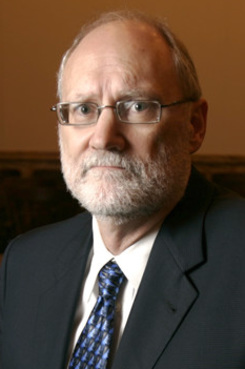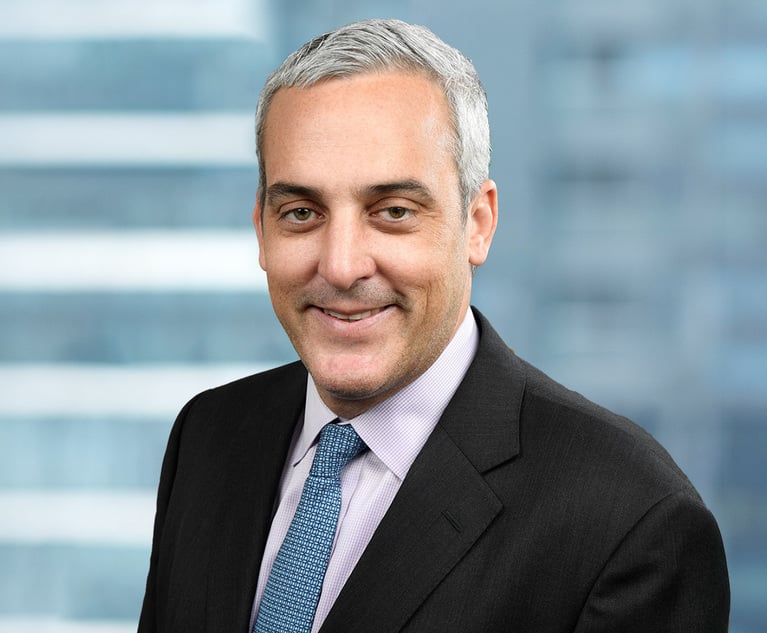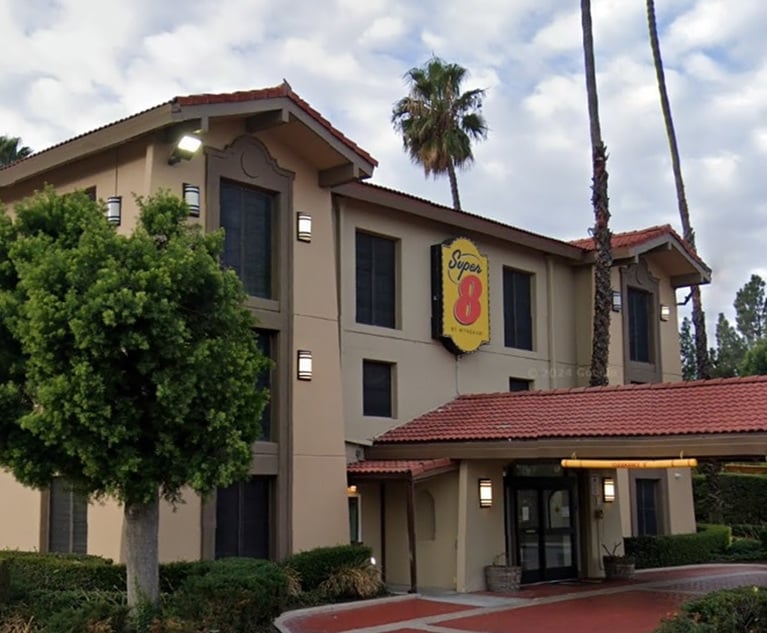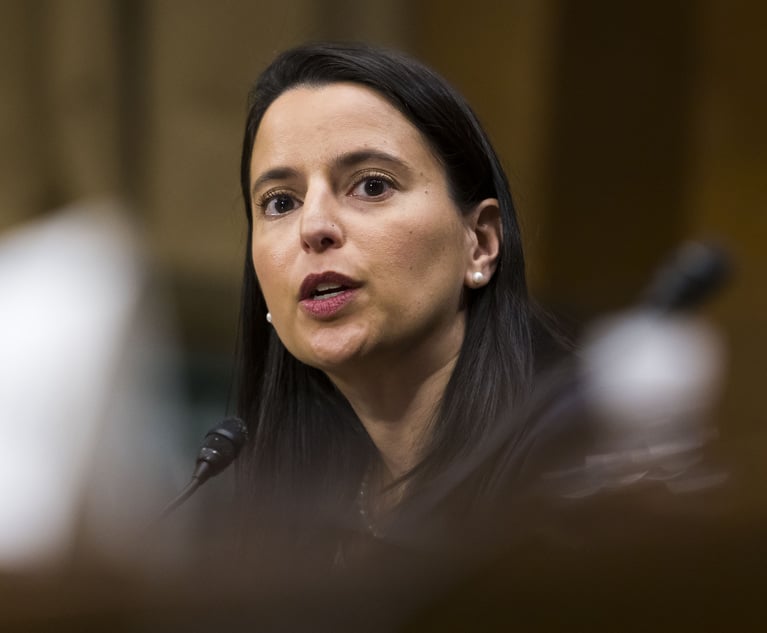Ninth Circuit Peppered DOJ's Chad Readler About Cutting Sanctuary Cities Funding
"So why do you care if there's an injunction against the actions that you're disavowing?" Chief Judge Sidney Thomas asked Readler, the acting head of the Justice Department's Civil Division in Washington.
April 11, 2018 at 05:46 PM
4 minute read
The U.S. Justice Department faced criticism Wednesday in court defending a Trump administration order that threatens federal funding cuts to cities and counties that restrict cooperation with immigration authorities.
Chad Readler, the acting assistant attorney general in charge of the DOJ's Civil Division, told a three-judge panel of the U.S. Court of Appeals for the Ninth Circuit that the November 2017 injunction blocking enforcement of the order nationwide was overly broad and unnecessary.
“The district court enjoined the order before any action had been taken under it,” Readler said during oral arguments in San Francisco. “It was a directive to two cabinet officials to use their discretion, to study the law and impose grant restrictions where appropriate. None of that happened.”
The counties of Santa Clara and San Francisco, which successfully sued to block the order, had administrative remedies they could have pursued if any federal grant was revoked, Readler said. The counties' concerns that the order could have targeted millions of dollars of federal health care or transportation money are unfounded, he argued.
 Chief Judge Sidney Thomas
Chief Judge Sidney Thomas“So why do you care if there's an injunction against the actions that you're disavowing?” asked Chief Judge Sidney Thomas.
Readler said the better question is why the counties sued to block an order that had not harmed them. “Any time an executive action is enjoined I think the government would claim harm from that,” he said.
U.S. District Judge William Orrick of the Northern District of California on Nov. 20 issued a permanent order enjoining the executive action, which he called “unconstitutional on its face.” Orrick rejected the DOJ's argument that the order affected only a small amount of money, and he cited comments from President Donald Trump about wielding the funding cuts as a “weapon” against so-called sanctuary cities.
Thomas pressed Readler on Wednesday about the president's remarks.
“We have a lot of statements being made by the president and others that he wants to withhold grant money from sanctuary cities,” Thomas said. “What are we to make of that?”
Readler said Orrick erred by considering the president's comments instead of focusing on the order and the subsequent enforcement directive by U.S. Attorney General Jeff Sessions.
“Many [statements] were made before the order issued, even before the election last year,” Readler said. “Some were made by White House press staff. That obviously doesn't trump what's one, in the order itself, and two, how the attorney general has interpreted it.”
The Ninth Circuit panel, which also included Senior Judge Ferdinand Fernandez and Judge Ronald Gould, had only one question for the counties' attorneys. Gould asked about why the injunction should extend nationally.
San Francisco deputy city attorney Christine Van Aken argued the injunction should extend at least to California, which distributes some federal funds to local government agencies.
“Clearly the harm from this executive order is nationwide,” she said, while acknowledging that the injunction's scope “is a matter of district court discretion.”
Sessions and other Justice Department lawyers have criticized the use of global injunctions, calling them a “deeply misguided practice.” The U.S. Solicitor General's Office is arguing at the Supreme Court this term against the nationwide injunction against the administration's so-called travel ban.
Read more:
Q&A With Pro Bono Lawyer Who Helped Block Trump's Sanctuary EO
This content has been archived. It is available through our partners, LexisNexis® and Bloomberg Law.
To view this content, please continue to their sites.
Not a Lexis Subscriber?
Subscribe Now
Not a Bloomberg Law Subscriber?
Subscribe Now
NOT FOR REPRINT
© 2025 ALM Global, LLC, All Rights Reserved. Request academic re-use from www.copyright.com. All other uses, submit a request to [email protected]. For more information visit Asset & Logo Licensing.
You Might Like
View All
Latham Adds Former Treasury Department Lawyer for Cross-Border Deal Guidance
2 minute read
Law Firms Expand Scope of Immigration Expertise Amid Blitz of Trump Orders
6 minute read
Trending Stories
- 1Public Notices/Calendars
- 2Wednesday Newspaper
- 3Decision of the Day: Qui Tam Relators Do Not Plausibly Claim Firm Avoided Tax Obligations Through Visa Applications, Circuit Finds
- 4Judicial Ethics Opinion 24-116
- 5Big Law Firms Sheppard Mullin, Morgan Lewis and Baker Botts Add Partners in Houston
Who Got The Work
J. Brugh Lower of Gibbons has entered an appearance for industrial equipment supplier Devco Corporation in a pending trademark infringement lawsuit. The suit, accusing the defendant of selling knock-off Graco products, was filed Dec. 18 in New Jersey District Court by Rivkin Radler on behalf of Graco Inc. and Graco Minnesota. The case, assigned to U.S. District Judge Zahid N. Quraishi, is 3:24-cv-11294, Graco Inc. et al v. Devco Corporation.
Who Got The Work
Rebecca Maller-Stein and Kent A. Yalowitz of Arnold & Porter Kaye Scholer have entered their appearances for Hanaco Venture Capital and its executives, Lior Prosor and David Frankel, in a pending securities lawsuit. The action, filed on Dec. 24 in New York Southern District Court by Zell, Aron & Co. on behalf of Goldeneye Advisors, accuses the defendants of negligently and fraudulently managing the plaintiff's $1 million investment. The case, assigned to U.S. District Judge Vernon S. Broderick, is 1:24-cv-09918, Goldeneye Advisors, LLC v. Hanaco Venture Capital, Ltd. et al.
Who Got The Work
Attorneys from A&O Shearman has stepped in as defense counsel for Toronto-Dominion Bank and other defendants in a pending securities class action. The suit, filed Dec. 11 in New York Southern District Court by Bleichmar Fonti & Auld, accuses the defendants of concealing the bank's 'pervasive' deficiencies in regards to its compliance with the Bank Secrecy Act and the quality of its anti-money laundering controls. The case, assigned to U.S. District Judge Arun Subramanian, is 1:24-cv-09445, Gonzalez v. The Toronto-Dominion Bank et al.
Who Got The Work
Crown Castle International, a Pennsylvania company providing shared communications infrastructure, has turned to Luke D. Wolf of Gordon Rees Scully Mansukhani to fend off a pending breach-of-contract lawsuit. The court action, filed Nov. 25 in Michigan Eastern District Court by Hooper Hathaway PC on behalf of The Town Residences LLC, accuses Crown Castle of failing to transfer approximately $30,000 in utility payments from T-Mobile in breach of a roof-top lease and assignment agreement. The case, assigned to U.S. District Judge Susan K. Declercq, is 2:24-cv-13131, The Town Residences LLC v. T-Mobile US, Inc. et al.
Who Got The Work
Wilfred P. Coronato and Daniel M. Schwartz of McCarter & English have stepped in as defense counsel to Electrolux Home Products Inc. in a pending product liability lawsuit. The court action, filed Nov. 26 in New York Eastern District Court by Poulos Lopiccolo PC and Nagel Rice LLP on behalf of David Stern, alleges that the defendant's refrigerators’ drawers and shelving repeatedly break and fall apart within months after purchase. The case, assigned to U.S. District Judge Joan M. Azrack, is 2:24-cv-08204, Stern v. Electrolux Home Products, Inc.
Featured Firms
Law Offices of Gary Martin Hays & Associates, P.C.
(470) 294-1674
Law Offices of Mark E. Salomone
(857) 444-6468
Smith & Hassler
(713) 739-1250







